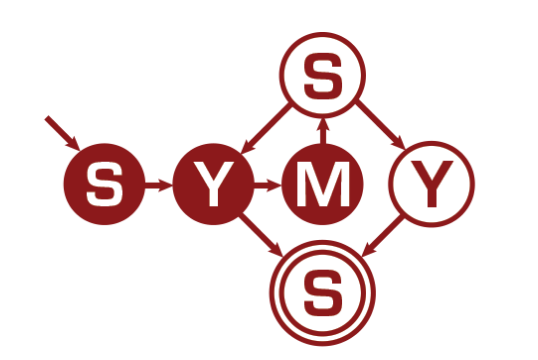Humans of SymSys: Sydney Maples
/Sydney is double majoring in Public Policy and Symbolic Systems with an individually-designed concentration in Computational and Data Journalism. She spends her time thinking about everything from Japanese linguistics to Virtual Reality. Here, she offers advice on how to navigate indecisiveness and find continuity in the SymSys major.
What drew you to the SymSys major?
I'd say that about 70% of it was the community and the other 30% was the classes/skills I wanted to learn. As a freshman, SymSys was my top choice for the latter reason, but I kept my options open just in case. Over time, I noticed that the kinds of people I liked to talk to most tended to be SymSys folk, or interested in SymSys-y subjects. I decided to declare the major during the first week of my sophomore year, following the advice of a few friends in my Arts Intensive seminar. I joined the SymSys Society shortly after (thanks to the encouragement of Ian Holmes, whom I randomly met in the office hours for Intro to Syntax!), which really helped root me to the community and increased my love for the department.
What is your concentration and why did you choose it?
I have an individually designed concentration in Computational and Data Journalism. My IDC was inspired by both the Computational Journalism department and the Virtual Human Interaction Lab, both of which I discovered as a sophomore. But more generally, I wanted to have a meaningful goal to aspire towards, as this works better for me than simply taking classes that fit under a certain umbrella. My IDC helped me ground my coursework into something practical that suited my ideals. I also realized that I like being part of a field that has defined its goals to a certain degree, but also allows some level of flexibility in terms of the methods used.
What’s your favorite SymSys-related class that you’ve taken so far?
I loved everything about BIO 150, especially the complexity portion. I also liked both CS 103 and PHIL 150 for helping me see how the mathematical concepts I took for granted could fit together in intuitive and perspective-broadening ways. I also loved taking PHIL 80 with Professor Donaldson, because I appreciated his precision in defining and clarifying concepts, and the class was useful for helping me understand how to construct a philosophical argument. Honestly, this list could go on for a while!
Are you involved in research? If so, tell us about a project you are working on:
Right now I'm working on best approaches to parsing PDFs, specifically when the queries being searched for are changing on a yearly basis.
What’s the coolest (loosely) SymSys-related topic that you’re excited about right now?
I really like East Asian languages, and right now I'm (broadly) interested in Japanese linguistics.
What do you think about the perceived "STEM-humanities" divide? Does SymSys bridge this gap?
I wouldn't say that SymSys is a humanities major, as the methods used are very different than the methods I've used in the humanities courses I've taken. But I think that the interdisciplinary nature of the major gets people motivated to think about problems that concern humanity, and also attracts people who are interested in the kinds of problems that the humanities are concerned with.
As a diverse major with a lot of flexibility, many students struggle to find continuity across their coursework. (How) do you address this?
Continuity is a matter of character, not of coursework. SymSys is flexible, but it isn't forcing you to be flexible. In fact, it is doing what essentially every other non-interdisciplinary Stanford major is increasingly encouraging you to do: broaden your horizons and be willing to learn skills within different fields if they prove to be useful to what you're studying. In an abstract sense, trust your own ability to form connections and match patterns! But in a more practical sense, I would suggest dedicating yourself to either your goals or your methods, and then designing your coursework around that. If you find that your goal is to be a professor one day, for example, that's just as valuable as discovering that you want to work on neural networks without an intended purpose in mind.
What is one piece of advice you'd like to offer to younger students?
It is helpful to develop a useful relationship with indecisiveness while you're in college. I've found that the only harm in indecision is being stuck wallowing in it. You're far more likely to do something new and interesting when you're not sure what you're doing than when you have a specific path figured out. So if you can't decide what your next move should be, do anything. School alone won't teach you what you want to become; only experience (both positive and negative) will teach you that. And ultimately, you'll probably spend more time deciding what to do next than regretting any one decision you've made.
Sydney is one of many profiles featuring selected alumni, undergraduates and graduates who are involved in the Symbolic Systems community.





